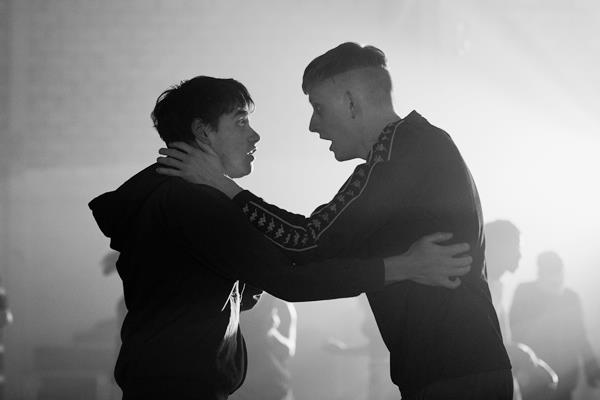

We’re in Scotland. It’s 1994, and the Criminal Justice and Public Order act has banned raves, which the British government defines as large gatherings where “amplified music is played… wholly or predominantly characterised by the emission of repetitive beats.” Nothing, however, is stopping teenagers Johnno (Cristian Ortega) and Spanner (Lorn Macdonald) from dancing like maniacs in their rooms to house music. They thrash their bodies in ecstasy—neither one is wearing pants. Johnno calls Spanner on the phone to make sure he too is listening to the same music. Then Johnno’s mom, Alison (Laura Fraser), enters and, for the time being, the party’s over.
Johnno and Spanner are soon to inhabit different worlds. Alison is dating Robert (Brian Ferguson), a cop who is anxious to win Johnno’s affection, and she’s moving her family to a more affluent neighborhood with high hopes for the new school system and a fresh start. Spanner, however, has dropped out of school and lives with his brother, Fido (Neil Leiper), a criminal with a bad reputation that he has passed down to his brother. Neither Alison nor Robert approves of Spanner. In fact, they ask Johnno directly to end the friendship more than once. Yet Spanner will not go away (in one scene he hides in Johnno’s bedroom), and he convinces Johnno to attend a rave that is happening in opposition to the government’s orders.
If the above sounds like well-worn territory, you should know that, in the hands of director Brian Welsh and writer Kieran Hurley (whose play the movie is based on), this story is fresh, startling, and irresistible. Beats is, in its modest way, a political film, making jabs at both the conservative UK government of the 1990s (and by proxy, the government of the present day) and at police violence. It’s also wrought with such incredible specificity—of time, place, and people—that it functions as an invigorating testament, and a shout of defiance, to the passage of time, to the friends who part ways, the music scenes that vanish. With distinctive black-and-white cinematography, masterful tracking shots, and an incredible ability to capture dancing bodies, Beats makes us feel as though we too are there.
This impression is mostly due to the characters, who are portrayed with such exactitude and with little polish. Some of them on paper might seem like stock figures—for instance, Laura (Gemma McElhinney), who is impressed at how Johnno stands up to her abusive boyfriend (boys in coming-of-age movies always seem to be meeting women who affirm them)—but they come across as actual individuals because the acting is so good and the writer and director have re-created this world and its people with such depth.
No one has been prettied up for the movie. There is D-Man (Ross Mann), the bearded, rebellious DJ who helps organize the party; Wendy (Rachel Jackson), Spanner’s cigarette smoking older cousin who hits a man in the face when he insults her looks; among many others. Johnno and Spanner are, of course, the crux of the film, and through them there is a genuine exploration of class differences, of friendship, and just a hint of homoeroticism.
It feels dishonest not to mention the party scene, which is incredibly captured and genuinely exciting as to make the viewer jealous of the characters and all the fun they’re having. Many people are talking about the things they wish they could do under quarantine. After watching Beats, they will probably want to dance.
















Leave A Comment